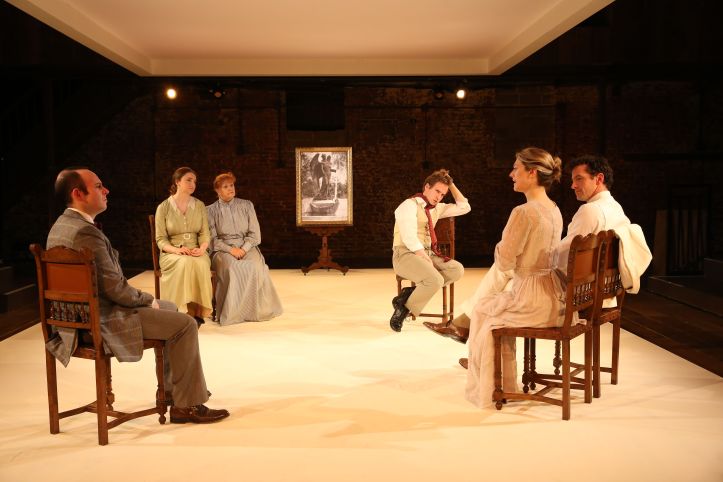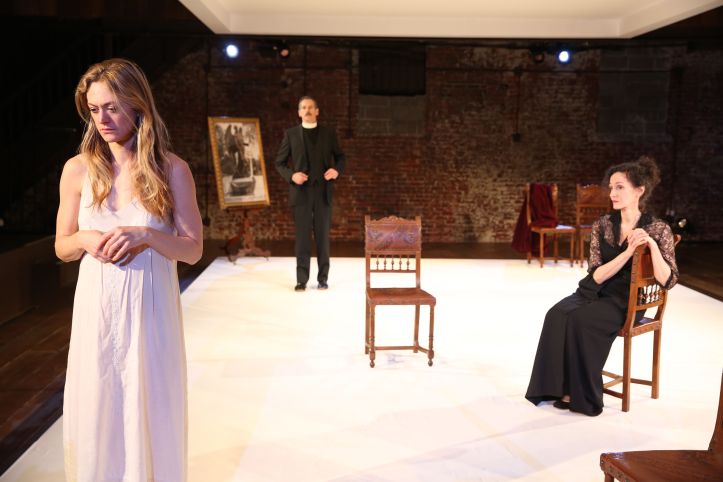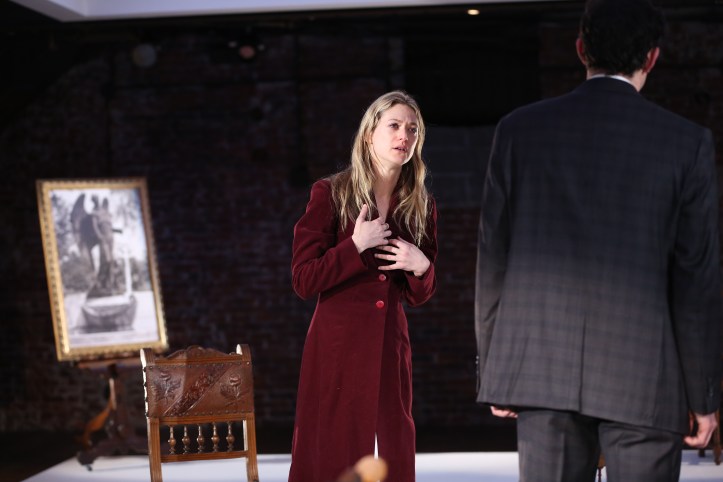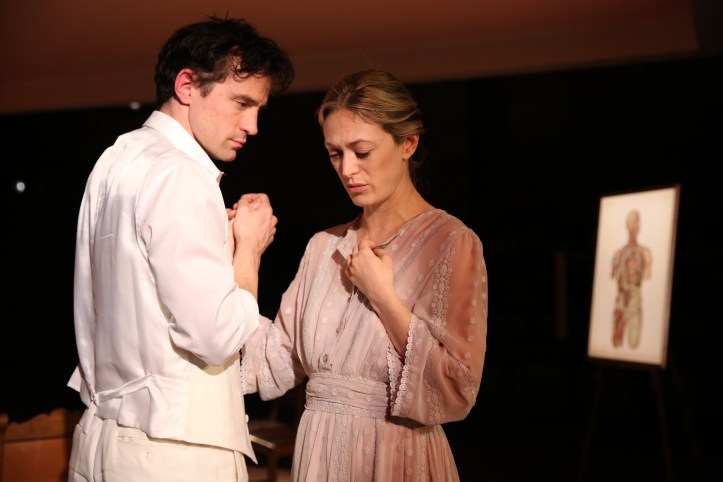
The Review: Tennessee Williams’ Summer and Smoke at the CSC
By Ross
Summer and Smoke, the lush southern lilt of a Tennessee Williams play currently being performed at the Classic Stage Company theatre takes us to the hot and steamy town of Glorious Hill, Mississippi, somewhere around the turn of the century. As visualized by the magical set designer, Dane Laffrey (Broadway’s Fool for Love, Once On This Island) for the Transport Group (the recent recipient of the New York Drama Critics’ Circle Award), the small town’s park and the angelic statue that sits perched above a fountain is a beautifully structured metaphor that opens up the telling of this sweaty southern play. Made up of a wide and bright expanse of white, the space geometrically enclose the inhabitants of this town as tightly as the prim religious rules of that time and place. The environment, which at first feels strangely too abstract and bright for this dark brooding play, starts to settle in to itself, or us into it. The white pulls us directly into the sparks and sputters that fly back and forth between these two hot and bothered neighbors and the wild fires it births beyond. At times, the production leaves almost too much to the imagination; the pantomiming of every little prop, including the often mentioned ice cream cone and even a pocket watch, is more distracting than engaging, taking us out of the moment rather than pulling us in. But the simplicity of the set, the challenging art of lighting by R. Lee Kennedy (TG’s Remember Mama), sound by Walter Trarbach (Spongebob Squarepants), and crisp costumes by the talented Kathryn Rohe (Pearl’s And Away We Go) overall does the trick, focusing our attention back on what is physicalized and electric, driving us deeper into the heat and the humidity of a Mississippi summer’s night.

The romantic and melancholy play, which first premiered on Broadway at the Music Box Theatre on October 6, 1948, faltered like an angel with her wings clipped. Much like the young woman struggling at the center of Summer and Smoke. This troubled angel is the highly strung, unmarried minister’s daughter, Alma Winemiller, played to Southern twang perfection by Marin Ireland (Broadway’s reasons to be pretty). The fire that burns and smokes deep inside her, burning a fever into her repressed soul is all due to her simmering attraction to the wild and undisciplined young Dr. John Buchanan Jr., the unmarried and unmoored son of the town doctor who lives next door. She can’t help herself but be drawn in and given the cold shivers by this doctor as he is as devilishly handsome and exciting as he is lost and troubled. Charmingly played by the very talented Nathan Darrow (Old Vic/BAM’s Richard III), he flounders and contradicts himself, fighting the soul that can’t quite seem to stand up or live up to the expectations of his father, the much beloved town physician, Dr. John Buchanan Sr, played roughly and heroically by Phillip Clark (Broadway’s Come Back, Little Sheba), a man who is infinitely better at taking care of his patients than he is with his own flesh and blood son.

The townsfolk that stroll in and out of the white rectangle all deliver the goods and the chairs in a beautiful dance of deliberation and exactitude, creating a juxtaposition to the smoldering bonfire that burns inside these two young creatures. Hannah Elless (Broadway’s Bright Star) is delicious as the not-so-innocent Nellie Ewell, and Elena Hurst (Dixon Place’s LULU) is more upfront and blatant, almost to a fault, with her sensuality as the eye-catching Rosa Gonzalez. Ryan Spahn (Primary Stage’s Daniel’s Husband), as the town’s tortured poet and salesman, is sadly underused, but invigorates the final moments of the play. It is in the eyes, words, and body of the town gossip, Mrs. Bassett, perfectly embodied by Tina Johnson (Broadway’s State Fair) that enlighten, and the twisted step-mother creation by Barbara Walsh (Broadway’s Company, Hairspray) that presents the walled-in melancholy where the repressed live. Devilishly taunting and pushing her step-daughter forward with a psychologically detached aggressiveness, the deranged Mrs. Winemiller laps up her ice cream with the only relish she can muster, and pushes away the hands that are offered to her by her religious and arrogant husband, the Reverend Winemiller, played stoically by T. Ryder Smith (Broadway’s Oslo). She yells “fight, fight” loudly, before stumbling onward into the darkness she has been assigned (or resigned) to.

But like the snap and bang of a firecracker thrown across the floor, thrown by John, ignites the spiritual and/or sexual dynamic that resides like dried twigs inside Alma. Like liquid dynamite, desire nearly explodes in on them, crushing their demeanor, asking for all, but preparing itself for nothing. Alma is mystified and amazed by her inner workings, especially surrounding the soulful mysteries that can and can’t be found under the microscope. Alma pushes back, desperate to stay up on her ineffably refined perch, driving a hysterical divide between herself and the man she can’t ignore, using everything she has, especially the gloriously effected way she speaks and laughs. Her poetic good diction and her fancy way of talking seem to hold her together for the most part, but pushes the devilish young doctor to tease and challenge her. Their angry love battle rages on, quietly and politely, within the confines of that devious southern charm that both hinders and keeps the fire burning and smoking. Her name, as Williams likes to make clear throughout the play, means “soul” in Spanish, and by the end, John and Alma have traded their voices and positions sensually and philosophically. In the beautifully sad way that Williams’ poetry flows effortlessly out of the mouth of the impressive Ireland much like the cool mineral water from that hard stone angelic statue, Alma is forced to proclaim that the battle is lost and won, and that she has “suffocated in smoke from something on fire inside her.”

In that ferocious battle with her soul and with John, it’s the argument he says she wins in the end that unleashes something buried deep inside. Identifying with the Gothic cathedral, Alma tries with all her might to reach “up to something beyond attainment“; but it’s also not the fight she wants to win ultimately. The battles that rage inside John’s heart are less fascinatingly explored in Williams’ play, diluting themselves in Spanish charm and subplots. The fire burns more brightly in Alma, and inside the complicated persona, Ireland gives a powerfully raw performance, almost matched by the more restrained Darrow, edging around the soulless anatomy chart, debating sensuality and modesty, before the whole thing gets smothered in the red coat of smoke and desire. “You were looking at me” says Alma, and all because of director Jack Cummings III (TG’s Queen of the Mist“) majestic work here at the Classic Stage Company, we can’t turn away, but only answer that question with a resounding, “Yes“.

[…] Daniel, keenly and precisely played by the wondrous Ryan Spahn (Transport Group/CSC’s Summer and Smoke), has created a modern clean living environment, perfect for entertaining guests for intimate […]
LikeLike
[…] by the spacial integrity of Dane Laffrey (Broadway’s Fool for Love, Transport Group’s Summer and Smoke) set design, with a strong support of technical director Aaron Gonzalez (Lyceum’s Ghetto […]
LikeLike
[…] I first saw Marin Ireland in last years Transport Group/CSC’s Summer and Smoke, I was literally blown away by the seductive and selective impulses that floated up and out of her, […]
LikeLike
[…] directed by Jack Cummings III (CSC/Transport Group’s Summer and Smoke), the Act One action is playfully and eccentrically set on its side, courtesy of set and costume […]
LikeLike
[…] Sea Wall/A Life Ammar Haj Ahmad, The Jungle Ethan Hawke, True West Marin Ireland, Blue Ridge and Summer and Smoke Zainab Jah, Boesman and Lena Nikki M. James, Twelfth Night Celia Keenan-Bolger, To Kill A […]
LikeLike
[…] in Two Parts, National Asian American Theatre Company Our Lady of 121st Street, Signature Theatre Summer and Smoke, Classic Stage Company/Transport Group The Waverly Gallery Uncle Vanya, Hunter Theater Project […]
LikeLike
[…] who destroyed us all with her breathtaking work in both ATC’s Blue Ridge and CSC’s Summer and Smoke this past year. She is truly a gift to the NYC stage, and one I will try to never miss in the […]
LikeLike
[…] within. Her multi-layered painful realization alongside Barbara Walsh (Transport Group/CSC’s Summer and Smoke) and the young Antonio Michael Woodard (Trinity Rep’s Ragtime) wraps just the right qualities […]
LikeLike
[…] with elegant grace and confidence by Jack Cummings III, just as he did in the glorious CSC’s Summer and Smoke, the two-part piece gently cruises its way down the road on the simply designed stage of The Duke […]
LikeLike
[…] with elegant grace and confidence by Jack Cummings III, just as he did in the glorious CSC’s Summer and Smoke, the two-part piece gently cruises its way down the road on the simply designed stage of The Duke […]
LikeLike
[…] with elegant grace and confidence by Jack Cummings III, just as he did in the glorious CSC’s Summer and Smoke, the two-part musical piece cruises its way down the road strong and proud like the Freedom Riders […]
LikeLike
[…] delectability. But with the deliciously talented Marin Ireland (ATC’s Blue Ridge; CSC’s Summer and Smoke) taking on the lead as she did in that SoHo Rep production, playing the impossible Marie […]
LikeLike
[…] Mary Page Marlowe), and the always intriguing Marin Ireland (ATC’s Blue Ridge, TG/CSC’s Summer and Smoke) shapeshift their way through the history of a woman and the city she struggled against. They find […]
LikeLike